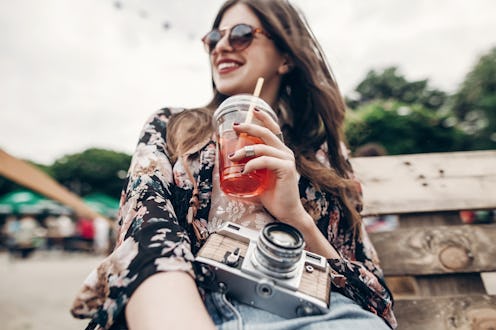Life
We Asked Dentists If Straws Really Protect Your Teeth From Stains & The Answer Was Unexpected

Straws are currently the focus of a fair amount of controversy. Single-use plastic straws, which are used once and then discarded, are a major pollution problem. While the often-cited statistic that Americans use 500 million plastic straws daily, according to the National Park Service, may be slightly exaggerated — no reliable statistics on plastic straw usage exist, according to NBC — there are still countless straws that make their way into the oceans, and can do serious damage to marine environments. For this reason, many cities around the world have introduced bills that would ban or impede the accessibility of plastic drinking straws at public establishments, a move that has drawn opposition from various groups — including people who use plastic drinking straws to protect their teeth from stains or other damage. But do straws really protect your teeth? We asked dentists what they thought — and were pretty surprised by the answer.
Seattle has now become the first major U.S. city to ban plastic straws entirely, and other places worldwide are following suit: a government proposal may mean the entire UK could ban plastic straws. Disability advocates are concerned that eliminating plastic straws would make drinking, especially in public, more difficult for disabled people, suggesting that further discussion is needed about how these proposals can balance the needs of disabled people and of the environment. But if your only reason for grabbing a straw is for convenience and keeping your pearly-whites pearly white, it seems you actually that may be less of an issue after all.
A lot of people who use plastic straws for substances like coffee likely cite their supposed staining protection as a reason. Dentists once believed that this reduction of contact between staining liquids and your teeth would stop teeth going yellow. But nowadays, the position is different.
“Don't believe the hype," Dr. Timothy Chase tells Bustle. "The usage of straws doesn’t keep staining liquids" — such as coffee, soda, red wine, or other liquids — "from touching your teeth, and they are bad for the environment." While direct contact between your teeth and liquids might be avoided slightly with straws, they're not going to protect them entirely, and other techniques are much more effective when it comes to keeping your teeth free from damage.
One aspect of the issue is that it's not just dark beverages that can stain your teeth. Dr. David Genet tells Bustle that "Even herbal and white teas can erode enamel and cause staining," in addition to white wine (gasp!). "Highly acidic foods and drinks can also lead to tooth discoloration, as can soy sauce, curry and tomato sauce, smoking or chewing tobacco, and certain diseases and even treatments for diseases, such as chemotherapy." So drinking with a straw certainly isn't going to prevent discoloration itself.
Straws themselves matter a lot less for preventing staining than your aftercare. "A trick that I recommend," says Dr. Alex Rubinov, "is rinsing your mouth with water immediately after drinking something that stains (coffee, red wine, green juice, etc)."
Dr. Genet agrees. "While sipping may be the proper way to imbibe your favorite beverage, gulping is preferable to preventing staining," he says. "When you do eat or drink something that has staining potential, swish your mouth with water, brush your teeth, or in a pinch, chew a piece of sugarless gum. Chewing gum and drinking water will also help your breath." Much more effective overall than a straw.
Plastic straws aren't the devil, and they're a lifeline for disabled people who need them, but they're also not going to keep your teeth from staining or other damage. If you just want a straw for the sake of convenience, advocate for your fave local café to use more eco-friendly reusable ones (or bring your own). Otherwise, says Dr. Chase, "skip the straw and save a dolphin.”